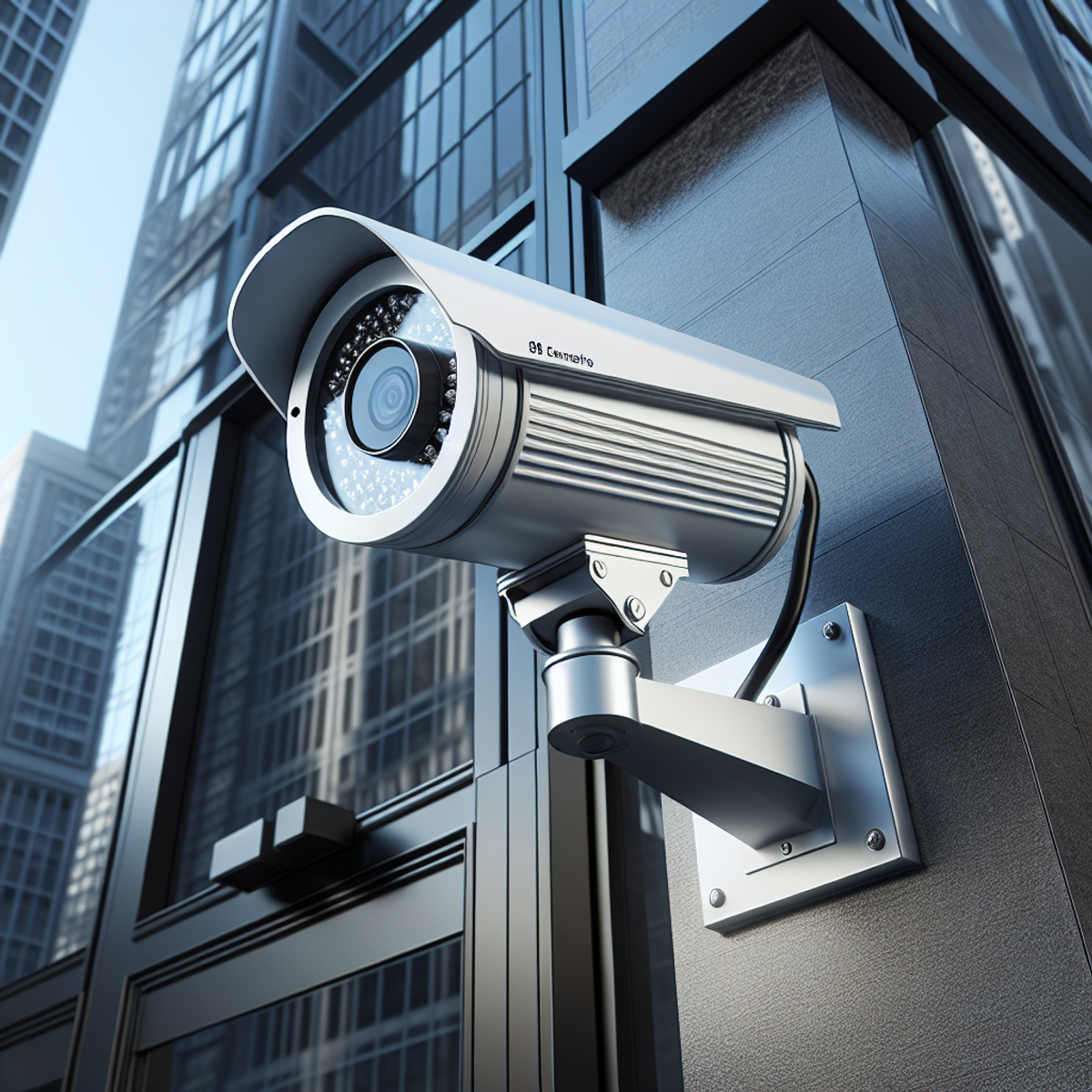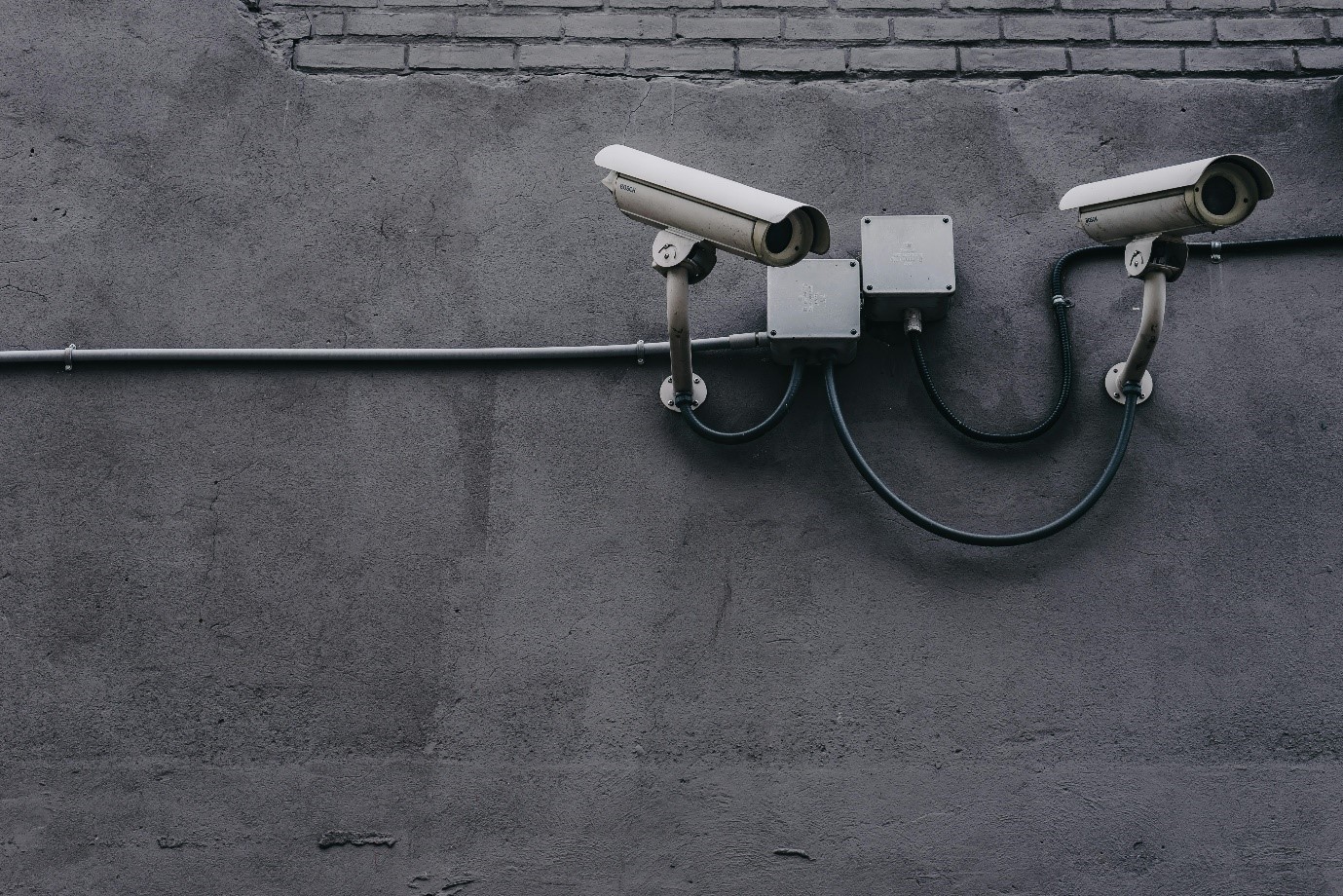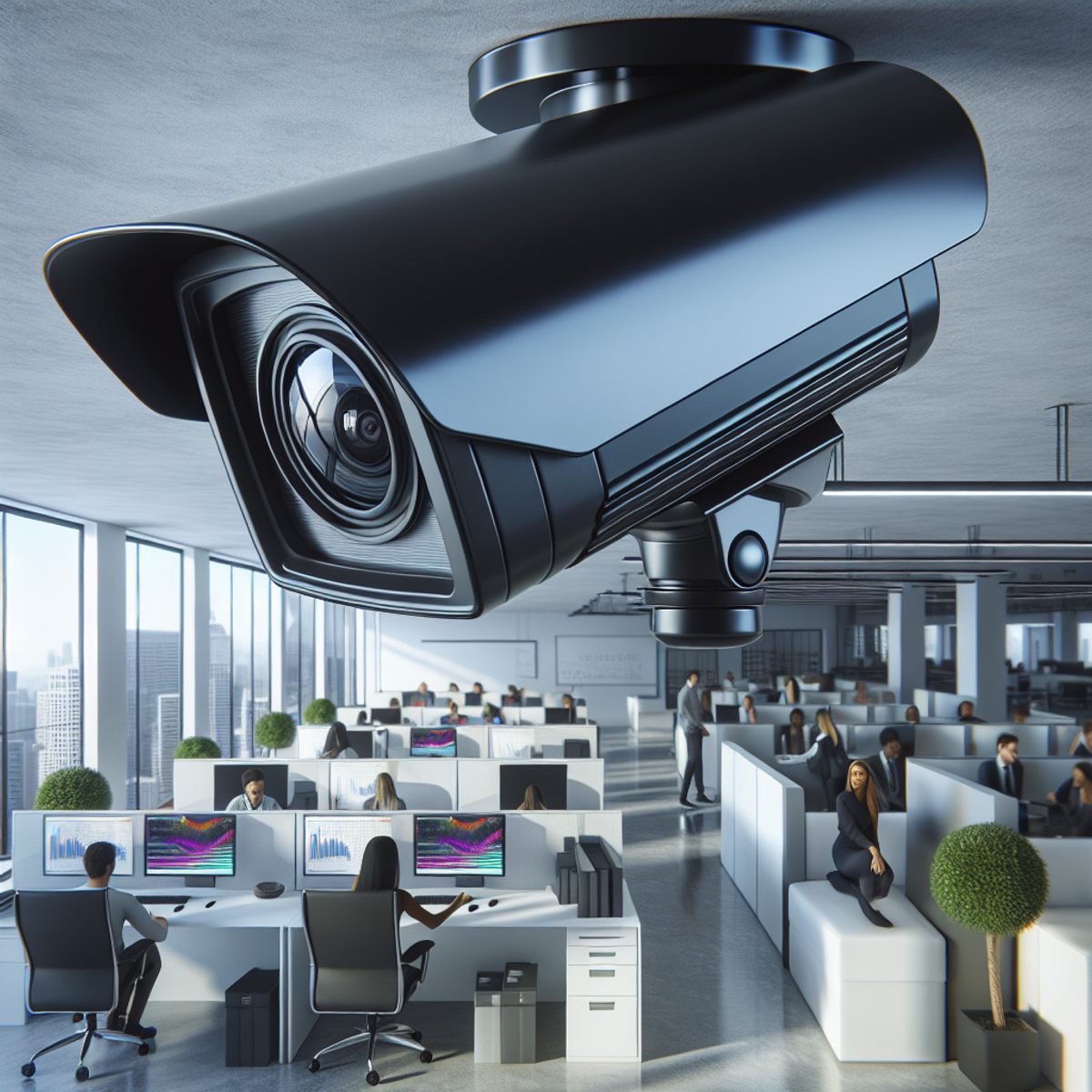Introduction
In today’s world, businesses face threats from both physical and digital sources. That’s why commercial security is so critical. It includes a range of solutions and services designed to protect businesses and their assets from various risks. Investing in commercial security is essential for business continuity and resilience.
There are several key components of commercial security:
Security Cameras: These provide comprehensive monitoring for deterrence and evidence collection.
Access Control Systems: These crucial tools manage physical security by restricting unauthorized entry.
Alarm Systems: Key components in immediate threat response, these systems alert you to potential intrusions.
Environmental Hazard Monitoring: These systems protect against fires, floods, and other environmental risks that can cause property damage.
Each of these elements plays a unique role in creating a strong security plan for your business. In the following article, we’ll take a closer look at each one and explain why they’re important for protecting your business.
1. Security Cameras for Comprehensive Monitoring
Security cameras are an essential part of any commercial security system. They play a crucial role in preventing and recording criminal activity. When potential intruders see security cameras, they are less likely to commit a crime because they know they could be caught on tape.
Here are some key benefits of security cameras:
Deterrence: The presence of security cameras can deter criminals from targeting your business.
Evidence: If a crime does occur, security cameras can provide valuable evidence for identifying the culprit and supporting legal actions.
Real-time monitoring: With live video feeds, you can keep an eye on your property in real-time and respond quickly to any suspicious behavior.
Remote access: Many modern security camera systems allow you to view the footage remotely through your smartphone or computer, giving you peace of mind even when you’re not on-site.
By investing in high-quality security cameras, businesses can significantly improve their safety measures and protect their assets.”
2. Access Control to Restrict Unauthorized Entry
A crucial component in any commercial security strategy is access control. These mechanisms, such as key cards and biometric systems, play a vital role in managing physical security by restricting unauthorized entry. Notably, different levels of access can be assigned to employees, visitors, and administrators based on their roles and responsibilities.
Here’s how access control can be implemented for different groups:
Employees
Regular staff may have access to general areas like workspaces and cafeterias but are restricted from entering sensitive zones.
Visitors
Visitor access is typically limited to public areas such as lobbies or meeting rooms.
Administrators
They possess the highest level of access, including server rooms, financial records, or other sensitive areas.
By implementing a robust access control mechanism, you can protect your business premises from potential threats and ensure only authorized individuals have access to specific sections of your property. This not only enhances the overall security but also aids in tracking user activities when necessary.
3. Alarm Systems for Immediate Threat Response
Alarm systems are crucial in commercial security as they provide immediate response to threats such as break-ins, theft attempts, or unauthorized activities. They can quickly notify the relevant authorities in these situations.
There are two main types of alarms: audible and silent. Audible alarms are designed to scare off criminals and alert people nearby with a loud noise. On the other hand, silent alarms discreetly inform law enforcement or security personnel without the intruder knowing.
However, alarm systems alone are not enough. They work best when combined with monitoring services. Here’s how it works:
Alarm Activation: When an alarm is triggered, it sends a signal to a central monitoring station.
Monitoring by Professionals: Trained experts at the monitoring station assess the situation.
Emergency Contact: If needed, they immediately get in touch with local law enforcement for a quicker emergency response.
By integrating alarm systems with monitoring services, businesses can enhance their security measures and improve their chances of preventing or minimizing losses from incidents.
From scaring off criminals to enabling swift emergency response, alarm systems are a vital part of a comprehensive commercial security plan.
4. Environmental Hazard Monitoring for Safety Compliance
Environmental hazard monitoring is an essential component of commercial security that focuses on detecting and preventing environmental risks such as fires, floods, and other hazardous conditions. Implementing these systems is critical for:
Fire Detection
Businesses equip themselves with advanced smoke detectors and fire alarm systems to provide early warnings. Quick detection helps in initiating prompt evacuation procedures, minimizing the risk of injury and property damage.
Flood Prevention
By incorporating water sensors in strategic locations, companies can detect early signs of flooding, allowing them to take immediate action to protect assets and critical infrastructure.
Safety Compliance
Adhering to safety regulations is non-negotiable for businesses. Environmental hazard monitoring ensures that a business complies with local and national safety standards, reducing the likelihood of costly penalties.
These systems are not only about safeguarding assets but also about ensuring the well-being of employees and customers. By integrating environmental hazard monitoring into the larger security strategy, businesses create a safer environment conducive to productivity and trust.
Tailoring Solutions to Business Needs
Security challenges vary greatly depending on the size and structure of a business, which necessitates a tailored approach to commercial security.
Small Businesses
Small businesses must navigate budget constraints while ensuring adequate security. Cost-effective measures like basic camera systems and DIY alarm solutions can be particularly beneficial. Employing smart locks and entry alerts allows for a manageable security setup without the need for extensive infrastructure.
Large Enterprises
For large enterprises, especially those with multiple locations, the complexity increases. Central management systems become vital to oversee operations seamlessly. These systems enable real-time monitoring and data analysis across various branches from a single location, ensuring uniformity in security protocols.
Multi-Site Enterprises
Cohesive security strategies are critical for multi-site enterprises. The objective is to implement a standardized security framework that can adapt to the distinctive needs of each site while maintaining an overarching control system. Integration of cloud-based platforms facilitates centralized updates and policy enforcement, streamlining security management across all properties.
Each business scenario demands careful consideration of specific risks and operational requirements to devise an effective commercial security strategy.
Integration of Intelligent Technologies
With the rise of intelligent technologies, commercial security has evolved beyond traditional methods. Businesses now have the ability to gain deeper insights and more precise control over their security operations.
How Intelligent Technologies Enhance Commercial Security
Here are three key ways in which intelligent technologies are enhancing commercial security:
Advanced Analytics: At the heart of modern commercial security is advanced analytics. This powerful tool analyzes large amounts of data from various sources such as entry logs, camera footage, and alarm history. By identifying patterns and anomalies, it provides business owners with actionable insights that can help prevent potential threats or improve operational efficiency.
AI-Powered Features: AI is changing how businesses approach security by introducing features like facial recognition and behavior analysis. Facial recognition technology offers an extra layer of verification beyond traditional access controls, effectively preventing unauthorized individuals from entering secure areas. Behavior analysis can detect unusual activities or movements within a premises, triggering alerts for further investigation.
Continuous Monitoring: The foundation of strong commercial security is its ability to maintain constant vigilance. Continuous monitoring ensures that every part of your business is under surveillance, 24/7. This constant watchfulness aids in maintaining awareness of what’s happening on-site, which is crucial for responding promptly to incidents or making informed decisions for future safety measures.
The Benefits of Integrating Intelligent Technologies
The seamless integration of these advanced technologies into commercial security systems offers several benefits:
Enhanced Protection: By leveraging the capabilities of advanced analytics and AI-powered features, businesses can better detect and respond to potential threats in real-time.
Proactive Threat Management: The combination of continuous monitoring with advanced analytics allows businesses to identify vulnerabilities and take proactive measures to address them before they can be exploited.
Operational Efficiency: The insights provided by advanced analytics can also help businesses optimize their security operations, leading to cost savings and improved productivity.
By embracing these intelligent technologies, businesses can strengthen their security posture and adapt to the ever-evolving threat landscape.
Emergency Response and Preparedness
Emergency response and preparedness play a pivotal role in commercial security, ensuring immediate action during crises. In the event of an intrusion, coordinating with law enforcement becomes an absolute necessity. This is where intrusion alarms come into the picture. Not just simple siren blaring devices, these systems can be enhanced with technology to provide verified alarms.
An intrusion alarm equipped with video verification sends real-time footage to the monitoring station when triggered, eliminating false alarms and helping law enforcement respond appropriately.
In addition to intrusions, commercial establishments must also be prepared for other threats such as fires. Fire alarm systems are critical for early detection of smoke or fire, enabling swift evacuation and minimizing property damage.
These elements combined in a system offer comprehensive fire protection, alerting occupants and emergency services at the first sign of danger.
Fire Protection Components
Fire detection sensors
Smoke detectors
Heat detectors
Creating effective emergency response protocols is another crucial component. These protocols outline the steps to take during various emergencies and should be communicated clearly to all employees. Regular drills reinforce these procedures, ensuring everyone knows their role when an emergency strikes.
As a business owner, your responsibility doesn’t end at installing security systems. You need to ensure that your staff is well-versed in emergency procedures for a well-rounded security strategy. A proactive approach to emergency response and preparedness can make all the difference between a minor incident and a major catastrophe.
Conclusion
Building a comprehensive and future-proof commercial security strategy is crucial for protecting your business assets, employees, and customers. For business owners, the time to act is now. By prioritizing security, you safeguard not only your immediate interests but also secure the longevity and reputation of your enterprise.
Here are some key actions you can take to strengthen your commercial security:
Embrace a proactive stance by implementing robust security measures tailored to your specific business needs.
Invest in advanced technologies to stay ahead of potential threats and enhance your capabilities in incident prevention and response.
Commit to continuous improvement by regularly updating your security systems and protocols to meet evolving risks.
Remember, the safety of your commercial property is non-negotiable. As a business owner, you have the power and responsibility to create a secure environment that fosters trust and growth. Take definitive steps today towards a safer tomorrow for your business enterprise by making commercial security a top priority.
FAQs (Frequently Asked Questions)
What is commercial security and why is it crucial for businesses to understand and invest in?
Commercial security involves implementing measures to protect a business’s physical assets, employees, and customers from threats such as theft, vandalism, and unauthorized access. It is crucial for businesses to understand and invest in commercial security to safeguard their operations, maintain a safe environment, and mitigate potential risks that could impact their bottom line.
What are the main types of commercial security solutions discussed in the article?
The main types of commercial security solutions discussed in the article include security cameras for comprehensive monitoring, access control mechanisms to restrict unauthorized entry, alarm systems for immediate threat response, environmental hazard monitoring for safety compliance, tailoring solutions to business needs based on size and structure, integration of intelligent technologies such as advanced analytics and AI-powered features, and emergency response and preparedness protocols.
What is the role of security cameras in commercial security?
Security cameras play a crucial role in deterring crimes by providing a visible surveillance presence and capturing valuable evidence if an incident occurs. They also enable real-time monitoring and remote access, allowing businesses to keep a close watch on their premises even when they are not physically present.
Why is access control important in managing physical security?
Access control mechanisms such as key cards and biometric systems are essential for managing physical security as they restrict unauthorized entry, manage different levels of access for employees, visitors, and administrators, and help prevent potential breaches or intrusions.
What are the benefits of integrating alarm systems with monitoring services?
Integrating alarm systems with monitoring services enables faster emergency response by alerting authorities or designated personnel when an alarm is triggered. This can help mitigate potential threats or incidents more effectively.
How can advanced analytics be harnessed for actionable insights in commercial security operations?
Advanced analytics can be harnessed to analyze data from various security systems and sensors to provide actionable insights such as identifying patterns of suspicious behavior or predicting potential security risks. This can help businesses proactively address security concerns.





